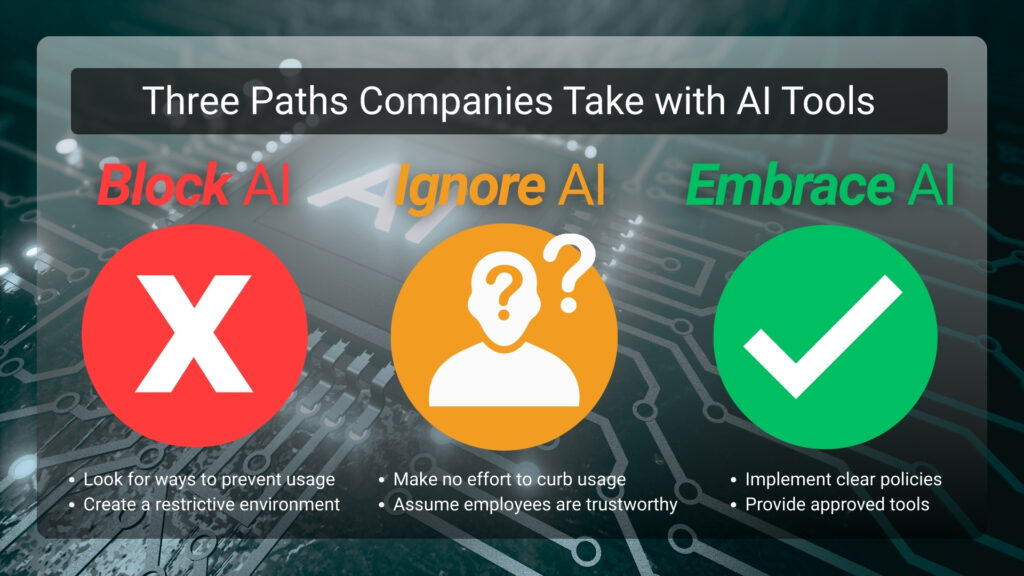Business Security and Employee Use of AI
There’s a heated debate right now around business security and the use of popular AI tools. IT managers are hashing over how to handle employees secretly using ChatGPT. Some companies try to block it at the firewall. Some rely on policies and trust. Others just accept that people will use AI tools whether leadership likes it or not.
The discussion reflects something I see every day with clients: Employees are already using AI, regardless of whether your organization has a plan for it. We call this “Shadow AI”—similar to “Shadow IT.” It’s what happens when companies don’t provide the right tools for the tasks at hand. Workers turn to unsanctioned tools to get the job done—or done faster.
The Rise of Shadow AI

ChatGPT and other large language models (LLMs) are easy to access, powerful, and free (or low-cost) at the point of use. That combination makes them a go-to engine for employees who want to speed up emails, create presentations, draft reports, or troubleshoot technical issues.
The problem? If they’re doing this outside of company-approved systems, your data and compliance posture are at risk. Sensitive client data could be pasted into public AI tools. Trade secrets might end up in prompts. Employees may rely on AI outputs that haven’t been fact-checked.
Once that data leaves your control, there’s no way to bring it back.
Why Blanket Bans Don’t Work

Some companies try to solve the problem by blocking ChatGPT or other AI tools at the firewall. On paper, this looks like a strong control. In practice, it creates bigger issues.
Employees simply switch to personal devices, hotspots, or home networks. They’ll copy-paste work back into company systems later—bypassing your controls entirely.
Even worse, bans send the wrong message: “We don’t trust you with modern tools.” For organizations competing for top talent, that attitude can hurt recruitment and retention. And in terms of productivity, preventing employees from using tools that could save them hours each week is a missed opportunity.
Trying to ban AI is a bit like trying to ban calculators in the 1990s—or Google in the early 2000s. History has shown us that blocking useful technology is rarely a winning long-term strategy.
A Smarter Approach: Embrace AI, Securely
The real solution isn’t to fight AI tools—it’s to bring them into the light. That means giving employees the right tools, with the right guardrails, so they can work smarter without putting your organization at risk.
Here’s what works:
- Clear AI Policies
Define what employees can and cannot do with AI. Spell out which tools are approved, what kinds of data can never be shared, and the consequences of misuse. Policies should come from leadership and be backed by HR, not just IT. - Training & Awareness
Most employees don’t want to cause a data breach—they just don’t realize the risks. Training should focus on safe use, spotting hallucinations, and verifying results. Show employees how AI can make them more productive and how to use it responsibly. - Secure Technology Choices
- Private GPT from K3 Technology: We help businesses deploy GPT models in private, secure environments. That means you get all the productivity benefits of AI without exposing data to third parties.
- Microsoft Copilot: For organizations already in the Microsoft 365 ecosystem, Copilot integrates with Word, Excel, Teams, and Outlook—leveraging your company data without sending it outside your tenant.
- Governance Tools: Microsoft Purview, Defender for Cloud Apps, and other monitoring solutions can help you track usage and enforce controls.
From Three Days to Three Hours
One of our clients wanted to speed up business processes. Employees were already using ChatGPT, but leadership was rightly worried about proprietary information being exposed. By implementing a Private GPT solution inside their Microsoft environment, we create the best of both worlds: faster turnaround on tasks with total data security. The custom solution is turning three-day projects into three-hour stints—without the risk of employees copying sensitive content into public tools.
AI Strategies for Businesses
Employees will use AI. The question is whether they’ll do it securely with your approval—or secretly with workarounds that expose you to risk.
Forward-looking organizations are leaning into AI adoption, not fighting it. By combining policy, training, and secure AI solutions, you can empower your team to be more productive and protect your company’s most valuable data.
At K3 Technology, we help businesses build AI strategies that work in the real world—balancing productivity and security. From Microsoft Copilot integration to Private GPT deployments, we give your team the tools they need to thrive in the AI era.
Ready to take control of Shadow AI in your business? Let’s talk about how to make AI secure, effective, and truly yours.


